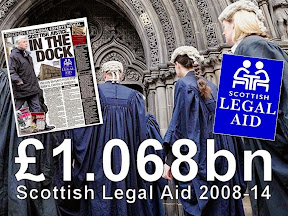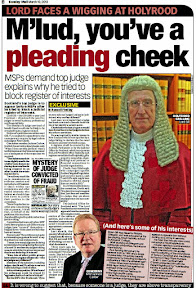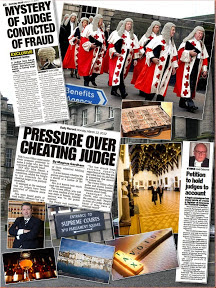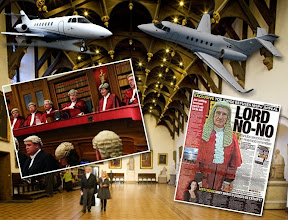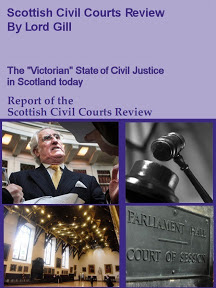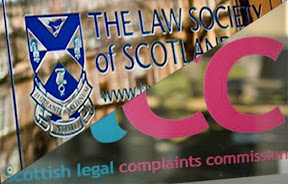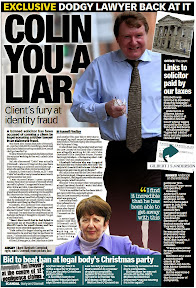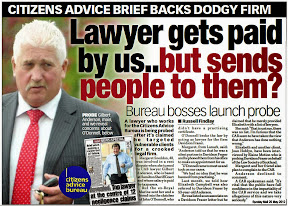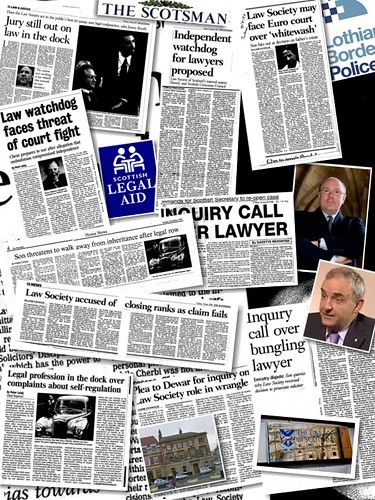 Bugled FOI release questions quashed convictions figures for Scottish judges. A ROW has broken out between the Judiciary of Scotland and the Scottish Court Service (SCS) over the release of information in response to a Freedom of Information request which sought data on appeals against conviction and sentence at High Court and Sheriff Court level.
Bugled FOI release questions quashed convictions figures for Scottish judges. A ROW has broken out between the Judiciary of Scotland and the Scottish Court Service (SCS) over the release of information in response to a Freedom of Information request which sought data on appeals against conviction and sentence at High Court and Sheriff Court level.
The data, which revealed numbers of quashed convictions against senior judges and a former Lord Advocate who also sat as a judge, has already forced apologies from the Chief Executive of the SCS to members of the judiciary and a partial retraction of the information provided via FOI legislation. However the SCS has since been ordered to review what information it did release, and publish a ‘correct’ version as soon as possible.
The now much debated information provided by staff from the SCS claimed that in the past five years, former Lord Advocate & Court of Session Senator Lord Hardie, now retired and sitting as a peer in the House of Lords, allegedly had eight convictions and 20 sentences successfully appealed.
More worryingly, the current number two in the Scottish Justice system, the Lord Justice Clerk Lord Carloway who supports the removal of a long held safeguard of corroboration from the Scottish criminal justice system, was revealed in the now allegedly defective information provided by the SCS as having seven convictions overturned against his judgements since 2008 and eight sentences successfully challenged.
Another well known judge, Lord Brailsford, recently in the news relating to twitter threats made by a family member, was revealed in the SCS statistics to have had four convictions quashed and 15 sentences challenged in the last five years.
Overall, the figures provided by the SCS showed that between 2008 and 2012, there were 301 successful appeals in High Court cases, including 86 overturned convictions.
The figures for legal challenges in Scotland’s Sheriff Courts revealed there were 1,619 appeals granted with 130 convictions quashed, with Sheriff Lindsay Foulis, who sits at Perth Sheriff Court, having two convictions and 39 sentences successfully challenged while in another example, the now retired Sheriff John Herald, who presided at Rothesay Sheriff Court had four convictions overturned and 20 sentences appealed successfully.
However, already up to their necks in controversy over secret financial dealings and undeclared interests in court case after court case, members of Scotland’s judiciary apparently blew several fuses over headlines in the media relating to the numbers of quashed convictions, demanding apologies & retractions over the information released by the Scottish Court Service.
The apology was swift, but for the most part it’s detail appears to rely on the fact that some of the information provided by the SCS exceeded the “five year” term of the FOI request itself … which does not exactly lead to a convincing retraction of claims already published widely in the media.
And in a somewhat humiliating move, the Chief Executive of the SCS was forced to personally write in one newspaper earlier this week in an effort to have his two week old apologetic statement published (reprinted below) … perhaps the delay was caused by everyone wondering what the judges are really up to for their £200K plus a year, expenses and a blank slate for interests on the side …
The Judiciary of Scotland were asked for comment, although none has been provided at time of publication.
There is a solution of course – publish the statistical records of judges, their judgements, legal challenges and successful appeals on a live basis and the Scots public will be able to see for themselves exactly how our wealthy, well paid, & secretive judges are actually performing in our clogged up “Victorian” Scottish courts system.
The apology : Information on Appeals – Statement by Chief Executive, Eric McQueen
On 18 June Scottish Court Service (SCS), in response to a request for information made in terms of the Freedom of Information (Scotland) Act provided data on appeals against conviction and sentence at High Court and Sheriff Court level. The data provided was by appeal type and by judge in respect of cases ‘overturned on appeal in each of the last five years’.
Since the data was originally released a number of serious discrepancies have been identified. Additionally, the SCS did not provide important contextual information as to the date of the original court decision in many cases the court decision which was subject to appeal was made more than five years ago.
SCS apologises to those affected. Specifically, SCS apologises to those members of the judiciary whose position has been misrepresented as a result of the data provided. The data attributed to the Lord Justice Clerk includes cases originally decided more than five years ago and includes cases in error. In the course of his judicial career, which commenced in 2000, Lord Carloway has had three cases in which the conviction was overturned and all of these predate 2008.
Likewise the data attributed to Lord Hardie contains errors in that the data indicated that he had eight conviction appeals listed as being sustained when the correct figure is five.
It is also considered likely that the data in relation to Lord Brailsford and Lord Woolman may contain similar inaccuracies and this is currently being checked.
The position in relation to sheriffs is being considered separately.
SCS is now reviewing all the data and will publish a correct version as soon as possible.








































